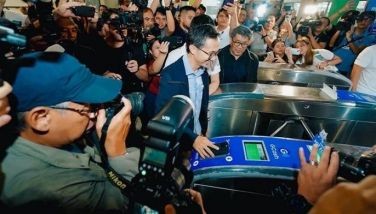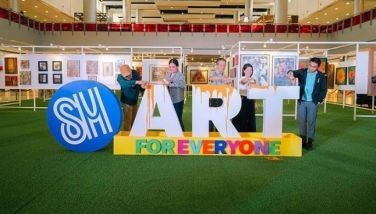10 Customs flaws: an insider's view

Believe it or not, aside from NBI director Nestor Mantaring lobbying to be retained by P-Noy, three of his four deputies and five region directors are applying to be the new chief.
* * *
Among the election issues raised by President Noynoy Aquino was transparency and accountability. Specifically he criticized the Supreme Court ruling on Romy Neri invoking executive privilege. The SC had let the former economic secretary keep secret what Gloria Arroyo said and did in 2007 after he reported a P200-million bribery attempt. This was despite the lack of state security or diplomatic nuance in the overpriced $329-million NBN-ZTE deal. What the ruling practically did was to allow cover-up of crime in the highest places.
Aquino can blunt the ruling via an executive order for public officials patriotically to bare all they know about bureaucratic shenanigans. A twin order would be for executive officials to appear in Congress if summoned, and not take refuge in any remnant of Arroyo’s hated EO 464. These could prepare the formation of the Truth Commission to investigate all Arroyo scams.
* * *
Career civil executive Atty. Ramon G. Cuyco was properly warned. Joining the Customs Bureau in Jan. 2003 would be jumping from the frying pan into the fire. He had faced heavy pressure before, at the finance department, in exposing a giant firm’s P1.1-billion and a leading lawyer’s P48-million false tax credits. Yet he was entering the den of iniquity that Customs is. Within two months he drafted reform measures. Predictably the agency crooks isolated him, while circumventing his authority. Still he persisted, and was able to identify “ten failings of the Customs Bureau,” for the P-Noy admin to correct, namely:
(1) Graveyard of professionalism. Postings and promotions are based on kinship, friendship and pecuniary interests. Ad hoc bodies, task forces, and special positions proliferate to accommodate bagmen. Graft busters are put in the freezer till they learn to “cooperate”.
(2) Unfair target setting. Finance bosses set collection quotas without consulting or entertaining questions from field collectors, examiners and appraisers. The law dismisses from the service those who flunk.
(3) Weak yard monitoring, border control and gate keeping. Imports, taxable or duty-free, must land in a port of entry; otherwise, smuggled. But free ports and economic zones have sprouted all over beyond the scope of Customs. Private port operators allow only favored Customs officers entry.
(4) Flawed selling of seized contraband. Forfeited and abandoned goods are deemed government property that may be sold. Customs rules purposely exploit loopholes in the auction law, enabling bribing smugglers to regain contraband. Or, officers filch the goods from the Customs storage.
(5) Anemic prosecution. Customs bosses trumpet accomplishments via televised crushing of contraband, like luxury cars recently, not through jailing of smugglers. The Legal Service that gathers evidence and files cases has been decimated by the reassignment of lawyers to other units.
(6) Defenseless operation areas. Grafters mislabel goods for “transshipment” to skirt inspection and taxation. They also allow over-withdrawal of goods from bonded warehouses.
(7) Regulatory capture. Importers, exporters, traders and brokers hold by the nose the very Customs brass who are supposed to regulate and monitor them.
(8) Useless anti-smuggling units. During his seven years at Customs, Cuyco has witnessed six task forces: ASIIC, NASTF, CASG, ASTF, TFAS and PASG. Except for TFAS that was under the Customs chief, outsiders headed the rest. All failed to dramatically increase collections and ended up as extortion gangs. The only major accomplishment, as a sarcastic joke goes, is the dropping of the letter T from their name to become “Ask Force”.
(9) Flawed concept of trade facilitation. Any attempt to institute better controls, no matter how logical, is condemned outright as violating the GATT and Kyoto Convention. Thus collection gaps and leaks abound in the name of speeding up trade.
(10) Misused automation. No sooner had Customs computerized than crooked officials and smugglers defrauded the system. False entries became bases for succeeding misclassification of goods and misappraisal of duties. Smugglers were able to dictate under what rules their contraband were to be cleared for entry.
* * *
P-Noy’s campaign against wang-wang (unauthorized vehicle sirens) caught on because law-abiding citizens are simply tired of being pushed around. To my column on the four laws that have long banned sirens, loud horns, whistles, blinkers, flashers, and similar devices of influence abuse, readers continue to react. Among them:
Romeo S. Rabino: “Why not also ground tricycles whose sidecars are too cramped for average passengers. There should be standards for the manufacture of sidecars.”
Philip Khalid: “Heavy tints are banned too, aren’t they?”
Eriberto A. Gutierrez: “From where I stood last night in Las Piñas I counted over 50 jeepneys plying the Alabang-Zapote route with headlights off. I notice this all over Metro Manila. Can we not compel their drivers to turn their lights on, for their and other motorists’ safety?”
* * *
”You do nothing for a child, if you do everything for him.” Shafts of Light, Fr. Guido Arguelles, SJ
* * *
E-mail: jariusbondoc@workmail.com
- Latest
- Trending





























